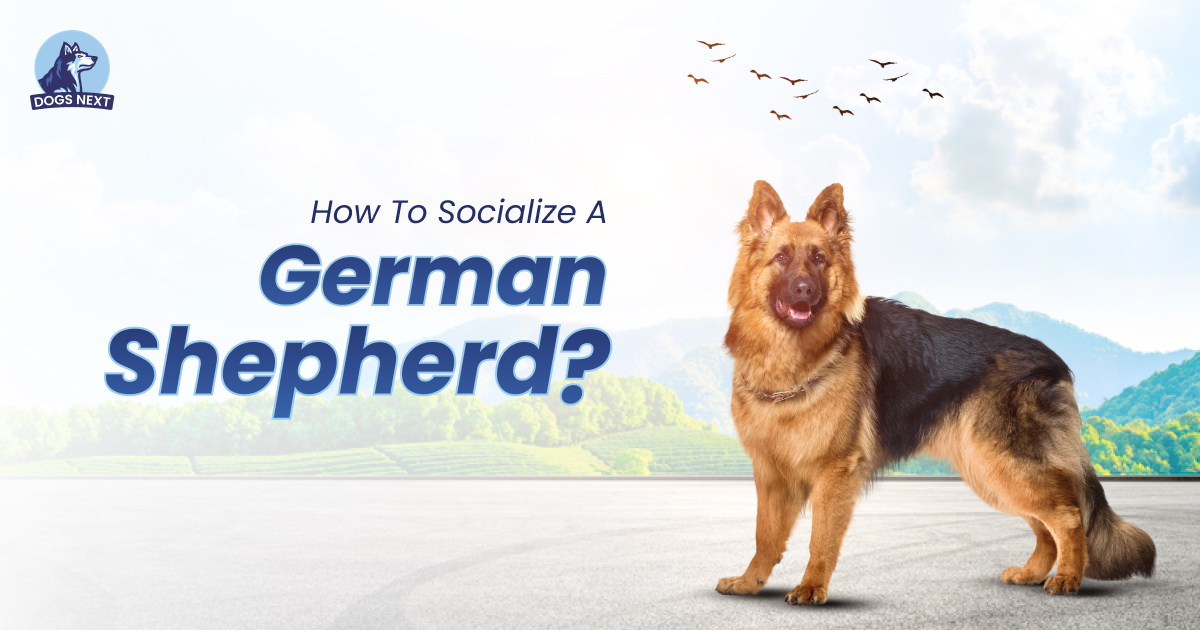Socialization plays a crucial role in the development of your German Shepherd’s behavior and temperament. By exposing them to a variety of experiences, people, and other animals in a positive and controlled manner, you can help them become well-rounded, confident, and friendly companions.
Here are some steps to socialize a German Shepherd: Early socialization, Positive reinforcement, Exposing them to different environments, Introducing them to various people, Socialize with other animals, Training classes, Controlled exposure to stimuli, Reinforcing positive experiences, Consistency and patience, etc.
In this article, we will delve into the importance of socialization for German Shepherds, the critical periods to focus on, and provide practical tips and techniques for effective socialization. Whether you have a German Shepherd puppy or an adult dog, this guide will equip you with the knowledge and tools to navigate the socialization process successfully.
Why is Socialization So Important for a German Shepherd?
German Shepherds are known for their intelligence, loyalty, and protective instincts, but without proper socialization, these qualities can become a challenge. Here are some key reasons why socialization is crucial for German Shepherds:
Behavior and Temperament
Socialization helps shape a German Shepherd’s behavior, teaching them how to interact appropriately with people, other animals, and their environment. It promotes positive experiences and reduces the likelihood of fear, anxiety, or aggression.
Confidence Building
Through exposure to different situations, people, and environments, socialization boosts a German Shepherd’s confidence. This confidence enables them to navigate new experiences with ease and adapt to changes in their surroundings.
Preventing Behavior Issues
Proper socialization can help prevent behavior problems, such as excessive barking, separation anxiety, or destructive tendencies. Well-socialized German Shepherds are more likely to be well-adjusted, balanced, and obedient companions.
Enhancing Safety
A well-socialized German Shepherd is less likely to pose a threat to others. They learn appropriate boundaries, become comfortable with handling, and are less likely to react negatively in unfamiliar situations.
When to Socialize a German Shepherd
The ideal time to start socializing with a German Shepherd is during their early developmental stages. Puppies have a critical period between 3 and 14 weeks when they are most receptive to new experiences.
However, socialization should continue throughout their lives to reinforce positive behaviors and adapt to changing circumstances.
How to Socialize a German Shepherd Puppy
Socializing a German Shepherd puppy involves exposing them to various people, animals, environments, and stimuli in a positive and controlled manner. Here’s a brief overview of how to socialize a German Shepherd puppy, followed by a table format for socializing different age groups and addressing specific challenges:
Gradual Exposure
Introduce your German Shepherd puppy to different environments, sights, sounds, and surfaces gradually. Start with low-stress situations and progressively increase the level of stimuli.
Positive Reinforcement
Use rewards, praise, and treats to reinforce positive behaviors during socialization. Encourage your puppy to associate new experiences with positive outcomes.
Puppy Classes
Enroll your German Shepherd puppy in well-structured puppy classes that focus on socialization and basic obedience training. These classes provide opportunities for controlled interactions with other puppies and people.
Let’s explore how to socialize German Shepherds at different ages and address specific challenges:
| Age Group | Socialization Tips |
| Puppy (1-Year-Old) | Continue socializing through exposure to new people, animals, and environments. Enroll in obedience classes for continued training and social interaction. |
| Adolescent (2-Year-Old) | Reinforce socialization by introducing your German Shepherd to new experiences, locations, and novel situations. Engage in regular positive reinforcement training to maintain good behavior. |
| Aggressive German Shepherd | Seek the guidance of a professional dog trainer or behaviorist to address aggression issues. They can help develop a customized socialization and behavior modification plan. |
| Older German Shepherd | While socializing older German Shepherds can be challenging, it’s not impossible. Focus on gradual exposure to new situations, people, and animals. Patience, consistency, and positive reinforcement are key. |
Remember, each German Shepherd is unique, and their socialization needs may vary. Tailor your approach based on their personality, comfort level, and any specific challenges they may face. Consulting with a professional trainer or behaviorist can provide valuable guidance for individual cases.
Starting Socialization Early
When it comes to socializing German Shepherd puppies, starting early is key. Puppies have a critical developmental period between 3 and 14 weeks, during which they are most receptive to new experiences. Here’s how to socialize German Shepherd puppies effectively:
- Puppy Classes: Enrolling your German Shepherd puppy in puppy classes is an excellent way to facilitate socialization. These classes provide supervised interactions with other puppies, helping them learn appropriate play and social skills.
- Safe Introductions: Ensure that introductions to new people, animals, and environments are safe and positive. Monitor interactions closely, provide guidance, and intervene if necessary to prevent fear or aggression.
Positive Reinforcement Training
Positive reinforcement training is an effective approach to socializing German Shepherds. By using positive reinforcement, you can shape their behavior, build trust, and enhance their confidence. Some key points to consider:
Reward-Based Approach: Focus on rewarding desired behaviors rather than punishing unwanted ones. Use treats, praise, and affection to reinforce good behavior during socialization.
Consistency and Timing: Be consistent in rewarding your German Shepherd for desired behaviors immediately after they occur. This helps them understand what actions are desirable and encourages them to repeat those behaviors.
Clicker Training: Consider incorporating clicker training into your socialization routine. The clicker serves as a precise marker for the desired behavior, making it easier for your German Shepherd to understand what they are being rewarded for.
Building Trust and Confidence: Through positive reinforcement training, you can build trust and confidence in your German Shepherd. This, in turn, helps them feel more comfortable in social situations and enhances their overall socialization experience.
Socializing with Other Dogs
Socializing your German Shepherd with other dogs is an important aspect of their overall socialization process. Here are some key points to keep in mind:
- Introduction to Dog-to-Dog Interactions: Introduce your German Shepherd to other friendly and well-socialized dogs in controlled environments. Allow them to interact gradually, monitoring their body language and behavior for positive signs.
- Dog Park Etiquette and Safety Tips: When visiting dog parks, ensure that your German Shepherd is comfortable with the environment and other dogs. Observe Park rules, supervise their interactions, and intervene if any signs of tension or aggression arise.
- Structured Playdates and Training Classes: Arrange playdates with other trusted dog owners or enroll in training classes that emphasize socialization. These controlled environments provide opportunities for positive interactions and learning appropriate social skills.
Exposing Your German Shepherd to Different Environments
To ensure a well-rounded socialization experience for your German Shepherd, it’s essential to expose them to a variety of environments. Here’s how to do it effectively:
Gradual Exposure
Introduce your German Shepherd to different environments gradually. Start with familiar, low-stress settings and gradually expose them to new places, such as parks, busy streets, or shopping centers. This gradual approach helps them adjust and build confidence.
Handling Stimuli
Help your German Shepherd become accustomed to various stimuli, such as loud noises, crowds, or unusual objects. Expose them to these stimuli in a controlled manner, pairing positive experiences with the stimuli to create positive associations.
Encouraging Adaptability and Confidence
By exposing your German Shepherd to different environments, you encourage adaptability and build their confidence. This exposure helps them feel comfortable and secure in various situations, making them more adaptable and less likely to exhibit fear or anxiety.
Socializing with People
Socializing your German Shepherd with people is crucial for their well-rounded development.
Meeting New People Positively
Introduce your German Shepherd to a wide range of individuals, including friends, family members, and strangers. Encourage positive interactions by rewarding calm and friendly behavior, and provide opportunities for gentle petting and interaction.
Introducing Children and Strangers
It’s important to introduce your German Shepherd to children and strangers in a controlled and positive manner. Teach children how to approach and interact with your dog safely, and gradually expose your German Shepherd to different individuals to help them become comfortable and friendly.
Managing Fear or Aggression Towards Humans
If your German Shepherd exhibits fear or aggression towards people, it’s crucial to address these issues promptly. Seek the assistance of a professional dog trainer or behaviorist to develop a behavior modification plan tailored to your dog’s specific needs.
Continuing Socialization Throughout Their Lives
Socialization should be an ongoing process throughout your German Shepherd’s life. To continue their socialization beyond puppyhood:
- Maintaining Socialization Beyond Puppyhood: Even as your German Shepherd grows older, continue exposing them to new experiences, environments, and social interactions. This helps reinforce their social skills and adaptability.
- Ongoing Training and Enrichment Activities: Regular training sessions and enrichment activities, such as puzzle toys or agility classes, provide mental stimulation and social interaction. They keep your German Shepherd engaged and help maintain their socialization skills.
- The Role of Regular Social Interaction: Regular social interaction with other dogs, people, and animals is crucial for your German Shepherd’s ongoing socialization. Arrange playdates, visit dog-friendly places, and maintain positive and controlled interactions to keep their social skills sharp.
Troubleshooting Common Challenges
While socialization is generally a smooth process, some challenges may arise. Below are some common challenges and tips for addressing them:
Addressing Fear or Aggression Issues
If your German Shepherd shows fear or aggression towards certain situations or stimuli, consult with a professional dog trainer or behaviorist. They can help you develop a behavior modification plan and provide guidance on desensitization and counterconditioning techniques.
Overcoming Shyness or Anxiety
For German Shepherds with shyness or anxiety, gradual exposure to new experiences, positive reinforcement training, and patience are key. Create a supportive environment and work with a professional to help your dog overcome their fears.
Seeking Professional Help if Needed
If you encounter significant challenges or your German Shepherd’s behavior becomes unmanageable, seeking professional help is essential. A qualified dog trainer or behaviorist can provide expert guidance and support tailored to your specific situation.
Frequently Asked Questions
Q: How do you socialize with your German Shepherd?
Ans: Socialize your German Shepherd by gradually exposing them to various environments, people, and stimuli. Use positive reinforcement, reward-based training, and controlled interactions with other dogs to build their confidence and encourage positive behavior.
Q: How do I make my German Shepherd friendly?
Ans: To make your German Shepherd friendly, provide them with positive social experiences from an early age. Introduce them to different people, animals, and environments in a controlled and positive manner. Use reward-based training techniques to reinforce friendly behavior and build trust.
Q: Can a 1-year-old German Shepherd be socialized?
Ans: Yes, a 1-year-old German Shepherd can still be socialized. While the critical socialization period is between 3 and 14 weeks, ongoing socialization is beneficial throughout their lives.
Q: What age should I socialize with my German Shepherd?
Ans: Socialization should begin as early as possible, ideally between 3 and 14 weeks of age.
Q: German shepherd socialization window?
Ans: The socialization window for German Shepherds is between 3 and 14 weeks of age. During this time, they are most receptive to new experiences and can develop positive associations with various stimuli.
Q: How to socialize with an aggressive German shepherd?
Ans: Socializing an aggressive German Shepherd requires professional guidance. Consult with a qualified dog trainer or behaviorist who can assess the underlying causes of aggression and develop a behavior modification plan. They will provide specific techniques to address aggression, ensuring safety and positive outcomes for both the dog and those around them.
Conclusion
In conclusion, socializing a German Shepherd is an essential aspect of their upbringing and development. By following the right techniques and approaches, such as starting early, using positive reinforcement, and exposing them to different environments, we can help our German Shepherds become well-rounded, confident, and friendly companions.
Remember, socialization is a lifelong process that should continue beyond puppyhood, with ongoing training and regular social interaction. Whether it’s introducing them to new people, other dogs, or various environments, the goal is to foster adaptability, trust, and positive behavior.

I’m David, an expert contributor and writer, with two furry friends of my own, I know the challenges of raising and caring for dogs. From training to nutrition and health, my goal is to provide valuable insights and advice to help create strong bonds and happy, healthy lives. Find me in Twitter.




